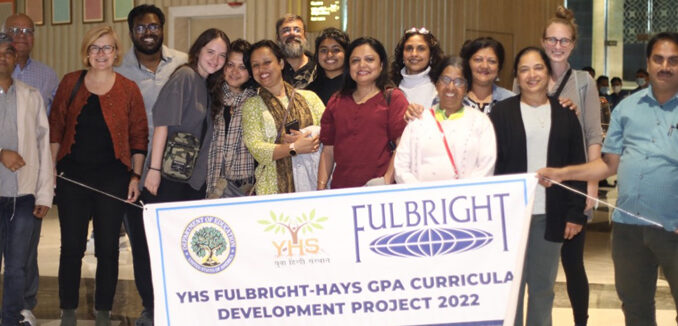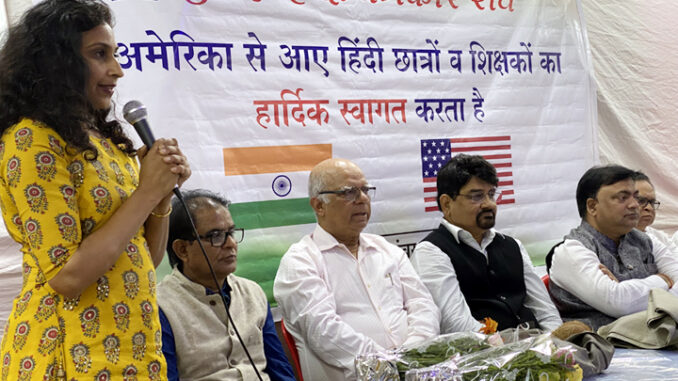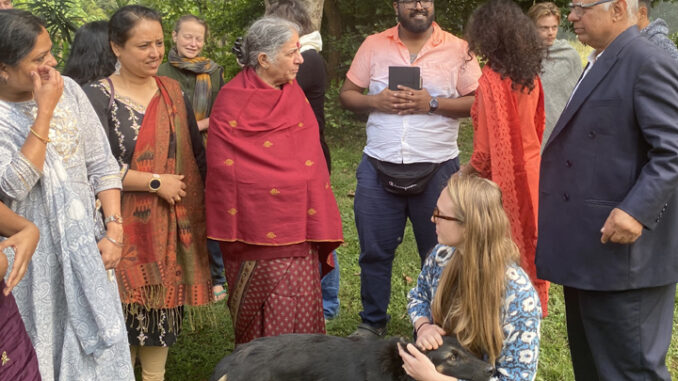The participants of YHS FULBRIGHT-HAYS GPA SHORT TERM CURRICULUM DEVELOPMENT PROJECT 2022 observed, learned, collected varieties of authentic materials at various locations in India during the 4 weeklong Study Tour from October 29-November 26, 2022.

In January 2022 I submitted to a proposal to the US Department of Education on behalf of Yuva Hindi Sansthan, a NJ based non-profit educational organization, of which I am the president. The proposal was approved and I was granted the ‘Fulbright-Hays GPA Short-Term /Curricula Development Award 2022’.
Under the program I was mandated to recruit of 12 US based teachers and students and led them on a Study Tour to India. I selected 12 participants on the basis of their academic interests and teaching goals. All participants had expressed their commitment to teaching Hindi in the cultural contexts. I conducted the Study Tour during the months of October and November 2022. The purpose of the tour was to familiarize US based teachers and student teachers with the ground realities at various locations in India, created by global warming and climate change,. The segment of ‘Sustainability’ was added into the area studies theme of ‘Climate Change’. Participants were required to study the impact of ‘Climate Change’, in the cultural contexts of India and be aware of the ‘sustainable’ lifestyle of certain communities. We were also required to collect authentic materials in the native land of the Hindi language, India.

The Study Tour program was facilitated as planned. All participants boarded the United Airlines flight on October 28, 2022 at Newark International Airport. We arrived at Indira Gandhi International Airport, New Delhi on October 29, 2022 where our Indian staff members welcomed us at the airport. The Indian staff included Binod Choubey, who was an experienced production manager employed with Adhikari Brothers in Mumbai. Cameraman Manoj Singh, has previously worked with me in India and was very excited to be part of this project. Rajesh Sah, the third member of the Indian staff, was entrusted with editing video footage that Manoj captured on a daily basis. Thanks to this team, we produced and edited more than two dozen video films during the tour.

I have been teaching Hindi in the United States for more than a one and half decade. As a language teacher I know how to integrate the World Readiness Standards in my teaching materials. I believe that ACTFL (American Council on the Teaching Foreign Languages) proficiency guidelines and the best practices endorsed by STARTALK Language Program offer an ideal framework for teaching a foreign language such as Hindi. In order to follow ACTFL proficiency guidelines and world Readiness Standards it is important to use ‘authentic materials’ that are needed to develop learning curricula. These authentic materials can only be acquired in the native land where the language was born. Hence our Study Tour played an important role in acquiring authentic materials. It supported the curricula developed on the basis of those materials by the language teacher participants. The curricula thus produced will be freely disseminated by the US Department of Education. On our part we will make all video films, produced during the Study Tour, available on our website, https://21stcenturyhindi.com/phase-ll.
For four weeks our team travelled to various parts of India that are deeply impacted by the climate change. First we travelled to Nainital, a hill station in the northern state of Uttarakhand. We camped at Hotel Vikram situated close to our academic partner, Kumaun University and downtown Nainital. Ajay Rawat, an environment expert on the ecology of the Himalayas, presented detailed information on land erosion and water pollution in the region. Next morning, we visited an area called Ballia Nala, where we witnessed the devastation caused by land erosion. Here we met with locals who live fearful of further landslide. A road passing through the area was completely cut off due to landslide. We learned that the city’s sewerage system was too old that created hollow spaces in the hills. We met activists who were working to create awareness among people about water pollution and climate.

We left Nainital for Jim Corbett Forest area and then to Dehradun, the capital of Uttarakhand state. We rented safari jeeps to travel inside the forest and observed the impact of Climate Change on the wildlife. We continued our journey to Dehradun where we camped at Navdhanya complex, a farmland established by the noted environmentalist Vandana Shiva, who mentored us on the traditional living. We observed people engaged in producing agricultural crops using compost fertilizer. Dr. Shiva lectured and demonstrated benefits of sustainable living that was possible with organic farming and a simple lifestyle. Our participants joined local farmers and villagers to get hands-on experience on sustainable living.
In order to enhance our knowledge and understanding about sustainable living we flew to Mumbai. We travelled by road from Mumbai to Dahanu, a coastal town where the Warli tribal folks live a self-contained life in their hutments. They use local resources to build huts, fishing and creating world famous Warli paintings. We met a few Warli artists and farmers to learn about ‘sustainability’ and depiction of life in their paintings. Our participants took part in art workshops conducted by experienced Warli artists and visited local schools to experience how Warli boys and girls were learning language and art.
Our fourth and the final destination was Alwar district in the state of Rajasthan-the region that has experienced water shortage for decades. Alwar is also home of dozens of wild animals who live in the forest of Sariska. We learned about impact of climate change on the local communities. There was depletion of water levels in local wells and ponds that affected the lives of people and animals. However, the local population has managed to store rainwater by construction small dams. The traditional methodology to rejuvenate wells, ponds and rivers was revived by Tarun Bharat Sangh, a local non-Government organization in the early Eighties. Since then, volunteers of TBS, under the mentorship of Dr. Rajendra Singh, a Magasaysay Award winner social activist, have been working with villagers to preserve water resources by constructing Johads and Pokhars, as the small dams are locally known as. They have preserved water for drinking and irrigating farmland, rejuvenated rivers to raise water levels in the village wells enabling women and girls to engage in more productive activities than just fetching water from miles away. Today the villages of Alwar district have enough water for drinking and irrigating their farmland. They are able to sustain their lives which has been facing impact of climate change.
(Ashok Ojha, a NJ based journalist and teacher, recipient of this year’s ‘Fulbright-Hays’ GPA project, funded by the US Department of Education, teaches Hindi under the banner of Yuva Hindi Sansthan, a non-profit educational outfit https://21stcenturyhindi.com/
Ashok directed dozens of federally funded language programs for teaching Hindi. He has also directed a number of educational films. Before moving to the USA in 1996 he worked as a journalist in India for more than two decades.
Email: aojha2008@gmail.com)



Be the first to comment